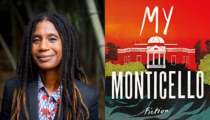With all of the bombing and explosions and smoke everywhere,…
In Remembrance of bell hooks: On Being Human
I met bell hooks in October 2014. At the time, I still held an image of her as an iconic writer rather than an enfleshed Black woman full of desire and deep feeling. She was, after all, one of the most consequential feminist writers and intellectuals of our time. And like most well-known, widely-read, and celebrated figures, I connected to the life-changing words that she penned in her books without realizing that her words were connected to a beating heart. bell was more than an avatar deserving of veneration.
Seven years ago, one of the organizers charged with curating her residency at the New School extended an invitation to join bell in a public conversation on manhood, alongside educators Oman Frame, Ron Scapp and Kurt Voss. To say that I was ecstatic to be in the same room with her would be an understatement. Before we walked out of the green room and into the packed lecture hall, bell jokingly asked, “You sure that you aren’t gay?” I laughed and affirmed that I was, in fact, a homo. But I remember that moment as revelatory. As I grew to learn, bell flirted and made jokes and gossipped and offered sharp cultural criticism and wrote conversation-starting books and loved and lusted and was erotic and spiritual and transparent and complicated because that was the stuff of her humanness.
As much as she wrote and talked publicly about love with a poignant and graceful brilliance, she was a writer/thinker who was only able to write with such stunning power about a variety of themes because she first wrestled with the ways such themes emerged in her own life. On another occasion, a few years after the New School talk, I visited the institute that bears her name at Berea College in Kentucky. After we finished our talk, we went back to her house, where we chatted about everything from the business of publishing to relationships.
I was stunned when she revealed that none of her books had ever made a bestsellers list or that she hadn’t received big advances for her works because she understood that the payback would come in the form of royalties. She schooled me that day. She told me about her writing regimen—how she reads one or two books a day and how she wakes up early to write. I silently wished that I possessed half of her will. She reminded me to write only that which moved me because that is what she did. And she shared stories about some of the relationships that she most cherished and even lamented her then-current lack of intimate partnership. I was single at the time and connected with her desire. I let her know that I didn’t want to write about a love that I didn’t experience in real ways, in real time, in my own life. She understood. No amount of books or celebritydom can fill the inner wells of desire that even the sharpest of writers do their best to explicate on the page. The writing is, at best, a proximate step towards that which is imagined. And that is one of the reasons I respected her—because she imagined for herself and for those of us who read her.
I want to remember bell’s imagination and her wide grasp of cultural theory among much else. But I also want to remember her laughter and her honesty. I won’t forget when I was honored to share an author’s table with her at the Tucson Festival of Books in 2018. As we chatted over dinner, opposite a table post with a picture of our books on it, a white woman table-mate interrupted our dinner and conversation to get in a few words with bell. Before too long, bell looked past me and into the eyes of the woman and said, “Do you mind? I am trying to eat my dinner and don’t want to talk right now!”
I gasped. bell was unafraid, and I thought about how freeing it would be to be more honest, even if such honesty hurts, because honesty can lead to transformation, which is what bell modeled in writing and her living. She labored to ensure that Black feminist theory was connected to a praxis and way of life. Radical honesty, on the page, meant the radical living of the words she wrote in her life.
I want to remember bell’s living. How she traveled and sat before crowds of people when her body allowed her to over the last several years, in spite of illness. How she would refer to herself, the writer, in third person. How she would spill tea with a casual ease in a way that was so reminiscent of a favorite aunty as our mutual friend, DaMaris Hill, once described her antics. I remember the story she told about building the bell hooks Institute and how her good friends, like Beverly Guy Sheftall, supported her while a few well-known scholars didn’t think it was worthwhile to support her effort at all. I know that some of those same scholars might be remembering and celebrating her today because that is what we do. We often only recall the good after the worst takes our people from us. But the gift that we can offer each other in this life or the next is a celebration of the full breadth of one’s humanity and her story.
Several days before bell passed, some of her friends traveled to Berea to surround bell with presence and love. I traveled to her home along with Stephanie Troutman and DaMaris Hill. Stephanie and I sat on opposite sides of bell, Stephanie holding one hand and me the other. “You still look good,” bell mumbled. I giggled through my sadness because I knew that bell’s spirit was still animating her mind and body. I sat silently because I couldn’t believe that a person who had become a force in the world of ideas, public intellectualism, and popular culture criticism was soon to transition. I didn’t know what to say besides, “I love you.” And I am forever grateful to have heard her reply, “I love you, too.”
Even in her last days, she taught me a lesson about humanity, namely, the truth that we should damn sure LIVE until we no longer can. And should we ascend, there are the records of our living. In her case, there are the words and moments, which if read carefully, will offer a glimpse into that which interlocking systems of power try to unravel—our relationships to self and to one another. And ain’t that a Black feminist lesson from someone who talked and dreamt and wrote all about love? ■



